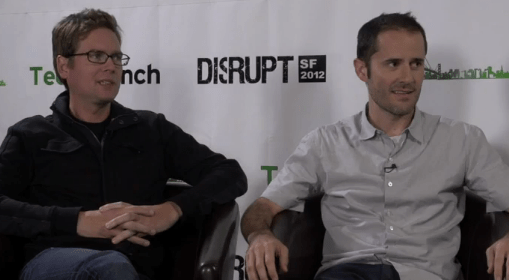Evan Williams and Biz Stone are probably still best known for their roles in co-founding Twitter, but what many people in the general public don’t realize is that Twitter was actually born as just a small project within a technology startup called The Obvious Corporation.
In recent months, Williams and Stone (along with Jason Goldman) have shifted a good deal of their focus back to Obvious, making it into a very unique kind of company — part incubator, part investment vehicle, part idea lab — with the simple goal of “creating products that matter.” Branch, Medium, and Lift are just a few of the big-idea projects that have emerged from Obvious so far.
Williams and Stone swung by the Disrupt SF conference earlier this month, and it was great to sit down with them for a few minutes after their on-stage conversation to dig a bit more into what they’re working on lately.
They’re a very thoughtful pair so the whole conversation was, I think, pretty interesting — and you can watch it all in the video embedded above. But I especially liked what they had to say about communicating with their co-founders and employees. At Obvious, Williams and Stone are known for sending long written missives in an almost stream-of-consciousness style about their general visions for the company. The reason they do this, Stone said, is because it’s better to say too much than to say too little. This bit starts at around 2:03:
“You can’t over-communicate. It’s just really important to share what’s on your mind with everybody, and to share with them where you’re at.”
Williams added:
“I think a lesson for founders is, it depends on the personality, but I try to make a point to [communicate] that because I’ve failed at that for a long time. People tell me I’m hard to read. But also, I just assume that people are thinking the same thing that I am, because we’re working on a project together. [I assume,] ‘You know where we’re going, right? Because we mentioned it one time, like three months ago, that we were going to do that thing. So, we’re going to still do that thing.’
And that doesn’t work, and especially it doesn’t work as your company gets bigger, because people have their own perceptions, and they see different things that you don’t see.”
And since Obvious’ projects have their own CEOs, I asked what one piece of advice they try to impart when it comes to leadership. Stone said:
“There are two pieces of advice. One is, be really passionate and emotionally invested in your project, or it won’t work. Don’t just do it because you think that other people will like it. You have to love it and want to use it yourself.
The other thing I think is, be really open and communicative with your co-founders about what exactly it is you want out of work and out of your life. Because otherwise, you’ll make assumptions about each other and you’ll be missing each other, and that will lead to a discordance.
It’s difficult to be super-duper open about everything you want out of your personal life and your work life. But at the same time, it is one of the most important things you can possibly do for the long term health of your company.”
